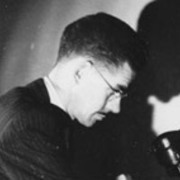
Oxley Hughan
Oxley Hughan spent 26 years working for the National Film Unit, including five years as one of the unit's senior directors.
Hughan joined the NFU as a production assistant in September 1941 — soon after the organisation's rebirth, initially to promote the war effort.
Within four years Hughan was directing for the Unit's Weekly Review newsreels, ranging from war-related pieces (the Italian-filmed Winter Front) to those back home (Māori Village).
In 1955 Hughan became a Senior Unit Director, a job which saw him travelling over all over New Zealand. He was especially interested in films that involved agriculture, and later said that his greatest pleasure was working in the high country. Hughan spent time on four hill country stations, and captured a high country sheep muster on the Brian Brake-shot The Snowline is their Boundary.
Though for long periods the NFU's films did not provide on-screen credits, Hughan also directed Farming in New Zealand (1952), Hill Country (1960) and centenary film Canterbury is a Hundred, which includes some farming sequences. Excerpts from the later title feature in the opening of Peter Jackson's Canterbury-set drama Heavenly Creatures.
Hughan also helmed the hour-long Royal New Zealand Journey (1954), whose advertising promised viewers the chance to "follow the Queen in all her dazzling splendour through ceremonial and pageantry never before seen in this country". Hughan commanded a team of ten to capture this chronicle of a six-week tour which encompassed New Zealand, Fiji and Tonga. The film was made in conjunction with British powerhouse the J Arthur Rank Organisation, and later screened in England and the United States.
The Maori Today, one of Hughan's last films as director, examined Māori urbanisation and culture through the lens of 1960. The film argues — now controversially — for the consolidation of Māori land into single title, and includes footage of artist E Mervyn Taylor and politician Eruera Tirikatene.
In 1960, after directing at least 14 films, Hughan moved into a more deskbound job as a producer. He would co-produce 80 plus titles for the Film Unit (often credited alongside longtime NFU boss Geoffrey Scott), and from 1962, 'supervise' production of another 50 plus Pictorial Parades. The magazine style Parades had launched in 1952, signalling the Film Unit's return to more scenic-orientated fare after the war.
Shortly before Hughan's retirement in December 1967, he talked about how filmmaking had changed. "Nowadays the camera is used more imaginatively, rather than in the British documentary style used when I started, and it has been interesting for me in the last five years to see the young fry of the Film Unit trying to make films in a new way."
Oxley Hughan passed away in Stoke, on the edge of Nelson, in January 1992.
Sources include
Clive Sowry
'Ends 26 Years with Film Unit' - The Evening Post, 16 December 1967, Page 20
'A Life in Films' - Listener, 21 June 1968, Pages 22/23 (Volume 58, No 1498)
Death Notice for Oxley Hughan - The Dominion, 21 January 1992, Page 19